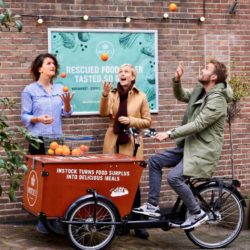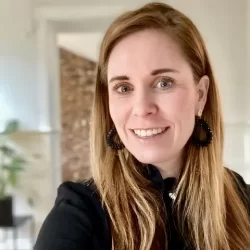Dutch start-ups tackling food waste

Dutch consumers throw away over 700 million kilos of food per year. Start-ups such as Stocklife and Instock are keen to prevent food being wasted unnecessarily. After all, discarding food is not only a waste of money and the product itself, but also of all the energy that has gone into producing, packing, refrigerating and cooking it.
By Marysa Vos
Food waste is an issue that affects the whole food chain, from farm to fork. Over the years, consumers have got used to seeing supermarket shelves neatly stocked with an abundance of perfectly formed fruit and vegetables. Due to production surpluses and misshapen fruit/vegetables, 39% of all food waste occurs on farms. Specific EU standards as well as retailers’ own additional demands mean that growers find it difficult to sell fruit and vegetables that are the wrong size or shape or are damaged in any way.
5% of the food that does make it onto store shelves is wasted due to misalignment of supply and demand. Every retail company faces the challenge of ‘dead stock’, such as when merchandise is approaching its sell-by date. Stocklife, a start-up B2B exchange platform, aims to eliminate waste by connecting buyers and sellers. The auction site enables companies to buy and sell older shelf-stable products such as Lipton IceTea or Haribo confectionery. Hence, it offers dead stock a new lease of life in what Stocklife calls the ‘blue way’ (no waste).
Consumers waste the most
The biggest source of food waste are consumers themselves. Each household wastes an average of 105kg of usable food a year, which equates to 42% of the total waste throughout the food supply chain. Another start-up, Dutch restaurant chain called Instock, hopes to make consumers aware of the scale of this problem by cooking with ingredients that would otherwise have been wasted elsewhere. Instock collects unsold products – such as blemished fruit and vegetables or day-old/leftover bread – from local producers.
Besides producers, retailers and consumers, another contributor to the unnecessary waste of food is the foodservice sector; in the Dutch food service industry, for example, no less than 15% of the food goes to waste. In this context Instock has launched InstockMarket.nl, an online marketplace to offer imperfect and surplus products to the foodservice sector. The ‘food rescue centre’ takes care of collecting and checking the food waste and posting details online. InstockMarket.nl gives chefs daily insight into what is available in the Netherlands and helps to find a new use for the products.
The founders of Instock and InstockMarket – Selma Seddik, Freke van Nimwegen and Bart Roetert (from left to right) – first met while working at grocery chain Albert Heijn, where they were horrified by the amount of food wasted every day. They decided to develop a plan to tackle the problem, and since then they have ‘rescued’ almost 700,000kg of food from going to waste.
Interested in start-ups? Come to inNOWvate this May, meet start-ups face to face and help decide who wins the supply chain start-up contest! Buy your ticket here.










